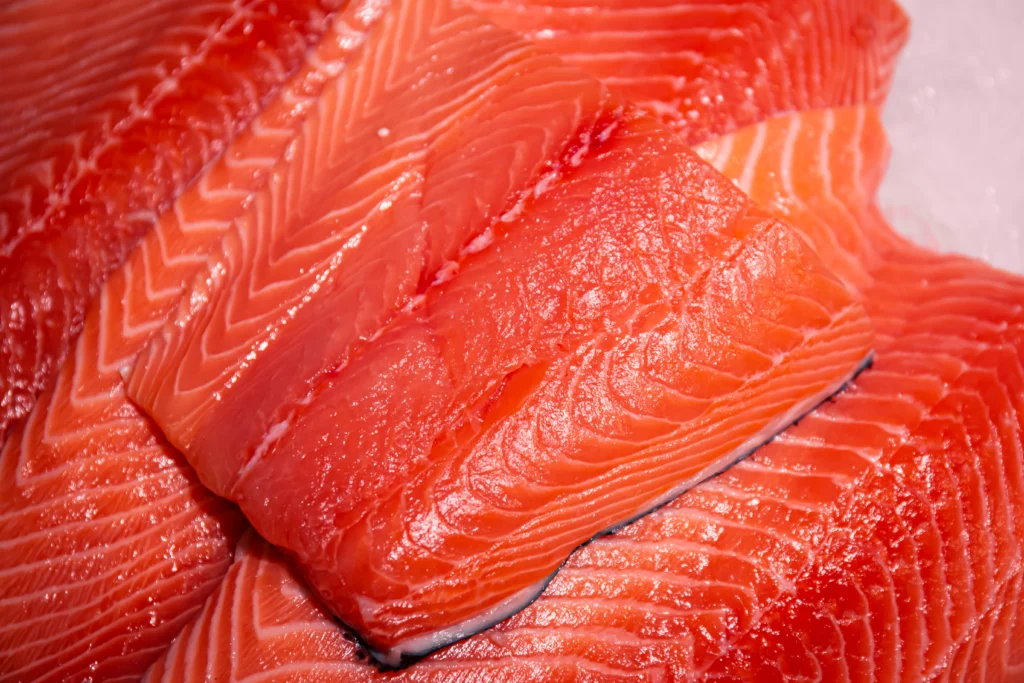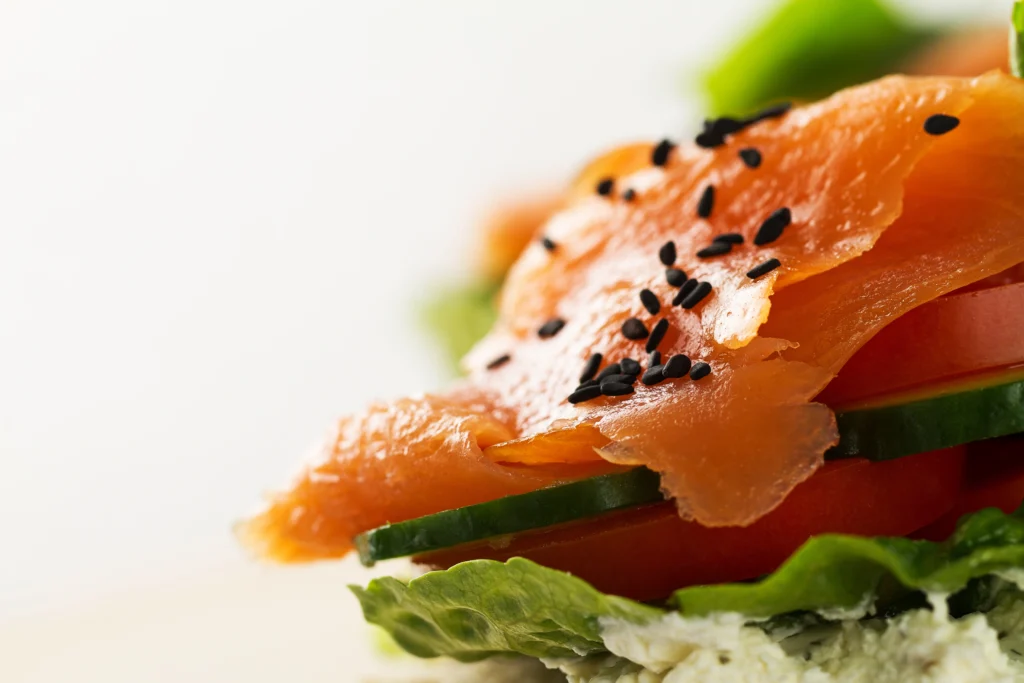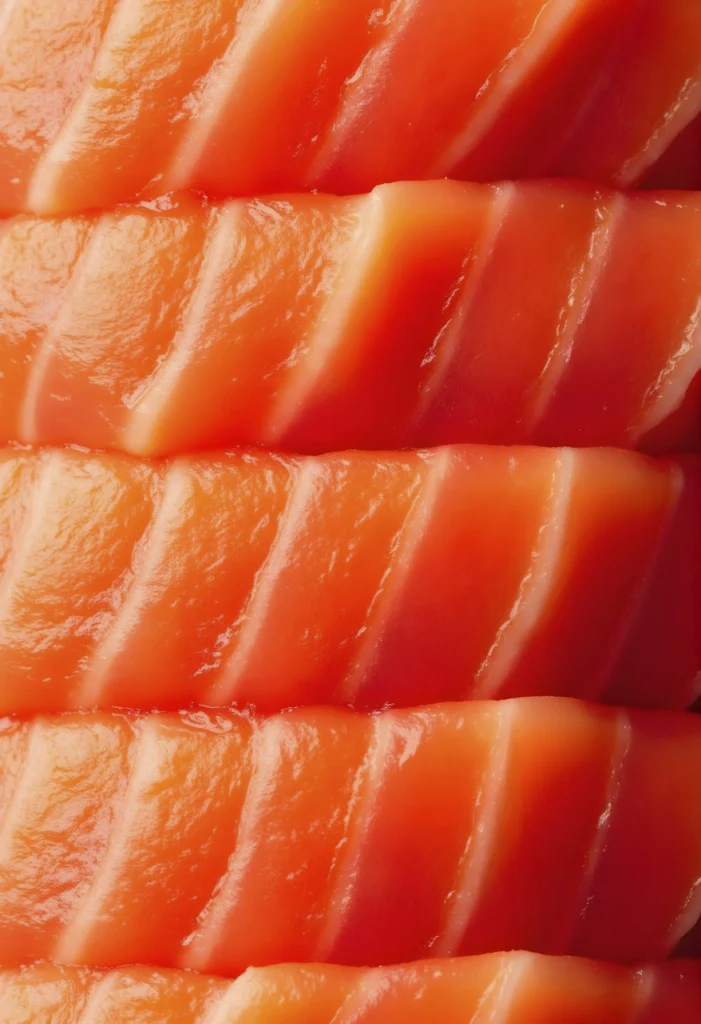Innovation in the food industry is on the rise with new vegan solutions that captivate both consumers and investors. This breakthrough paves the way for a more sustainable and healthier future.
Revo Foods & Paleo Make Waves are leading this revolution with an innovative partnership. This collaboration combines precision technology and 3D printing to create alternatives to conventional salmon. In this article, we explore every aspect of this project that promises to transform the vegan food market.

Revo Foods & Paleo Make Waves
The partnership between Revo Foods and Paleo marks a new era in the food sector. Belgian company Paleo has joined forces with the innovative, Vienna-based Revo Foods to develop alternatives to traditional salmon. This initiative is backed by €2.2 million in funding from the European Union. The financial support will help develop myoglobin to recreate the characteristics of salmon in a 100% vegan product.
The strategy is based on Paleo's precision fermentation technology. This technique enables the production of animal proteins using yeast, without involving animals or transgenic methods. Additionally, Revo Foods uses its 3D printing technology to structure the ingredients and achieve a texture similar to salmon. This synergy between the companies highlights their commitment to innovation and sustainability.

The Technology Behind Vegan Salmon
The development of vegan salmon relies on two main technologies: precision fermentation and 3D printing. Each technique is vital to replicate the flavor and appearance of traditional salmon.
Precision Fermentation
Paleo uses precision fermentation to create myoglobin. Myoglobin is a key protein for the color and flavor of meat products. With this technology, the company produces proteins using yeast. The process is cruelty-free and does not use animal-derived ingredients. This approach ensures a final product that is GMO-free.
3D Printing in Food Production
Revo Foods innovates by integrating myoglobin into its product using 3D printing. This technology allows for the precise incorporation of various materials, such as proteins and fats. The result is a vegan salmon fillet with a texture and taste very close to traditional salmon. In September 2024, the company will inaugurate the “TASTE FACTORY,” the world's largest 3D food-printing facility, in Vienna.
Partnership and Funding: The Role of the European Union
The collaboration between Paleo and Revo Foods is supported by a significant investment. The European Union has allocated €2.2 million to this project. This funding is part of a larger initiative called Eureka Eurostars, which supports small and medium-sized enterprises (SMEs) in collaborative research and development projects.
The financial boost aims to accelerate innovation and enable the use of advanced technologies. Over the two-year project, which will begin in August 2024, the companies will work together to perfect the vegan salmon. The goal is to enhance both the visual appeal and the nutritional value of the product.
Innovations in Precision Fermentation and 3D Printing
The fusion of precision fermentation with 3D printing is one of the most innovative aspects of the project. This integration results in a food product that closely mimics salmon without harming animals or the environment.
Innovative Production Process
The production begins with precision fermentation. Paleo creates myoglobin using yeast in a controlled environment. This process is completely free of animal practices and results in a clean, sustainable product. Next, Revo Foods applies its 3D printing technology. This method integrates the myoglobin with other ingredients, forming a fillet that resembles salmon in color, texture, and flavor.
Practical Application Examples
Imagine a consumer who wants to enjoy a salmon fillet without contributing to overfishing. With these technological advancements, they can choose a vegan option that preserves the environment. Moreover, large-scale production is facilitated by the automation and precision of 3D printing. This makes the product accessible and of high quality.

Environmental Impact and Nutritional Benefits
The project brings significant benefits to both the environment and health. By replacing conventional salmon with a vegan alternative, there is a notable reduction in the ecological footprint. Rearing fish in natural habitats or intensive farms creates environmental impacts, such as pollution and the degradation of marine ecosystems.
Sustainability and Impact Reduction
Using myoglobin produced through precision fermentation eliminates the need to raise fish for consumption. This reduces the pressure on natural resources and decreases greenhouse gas emissions. The technology used is a major step toward a more sustainable future. The partnership between Revo Foods and Paleo demonstrates that innovation can go hand in hand with environmental preservation.
Nutritional Value and Health
The vegan salmon promises to be rich in protein and iron. These nutrients are essential for a balanced diet. By incorporating myoglobin into the recipe, the product gains nutritional value. Consumers can access a healthy alternative free of artificial preservatives. This breakthrough is especially important for those following vegan diets or seeking to reduce the consumption of animal-based products.
Challenges and Future Perspectives
Despite the advances, the project faces technical challenges and market acceptance hurdles. Both the fermentation and 3D printing technologies are still in a phase of development and continuous improvement. Some obstacles include high production costs and consumers adapting to new flavors and textures.
Technical Challenges
The technological processes require constant investments in research and development. Creating a myoglobin that perfectly replicates the flavor of salmon is complex. Small variations can affect the final result. Integrating different ingredients in 3D printing demands extreme precision to maintain product consistency.

Market Perspectives
The demand for vegan products is growing every day. Consumers are looking for healthy and sustainable alternatives. If the technical challenges are overcome, vegan salmon could capture a significant market share. The combination of innovation, sustainability, and nutritional value can drive this food revolution.
Key Points [Revo Foods & Paleo Make Waves]
- Innovative Partnership: Revo Foods and Paleo combine advanced technology to create vegan salmon.
- Robust Funding: The project has the support of €2.2 million from the European Union.
- Integrated Technology: Utilization of precision fermentation and 3D printing to replicate salmon.
- Environmental Benefits: Reduction in ecological footprint and preservation of natural resources.
- Nutritional Value: A product rich in protein and iron, ideal for healthy diets.
- Surmountable Challenges: Ongoing research investments to enhance flavor and texture.
Table: Advantages and Disadvantages of the Product
| Advantages | Disadvantages |
|---|---|
| 100% vegan and cruelty-free product | High production cost due to advanced technology |
| Use of innovative and sustainable technologies | Challenges in adapting consumers to new flavors and textures |
| Reduction of ecological footprint and protection of natural resources | Continuous investment in research and development required |
| High nutritional quality with protein and iron | Complexity in integrating ingredients through 3D printing |
Summary Table [Revo Foods & Paleo Make Waves]
| Features | Benefits |
|---|---|
| Partnership between Revo Foods and Paleo | Development of an innovative and sustainable vegan salmon |
| €2.2 million funding from the European Union | Acceleration of research and development in food products |
| Use of precision fermentation to produce myoglobin | Creation of proteins without using animals and without GMOs |
| 3D printing to structure the food | Achieving texture and appearance similar to traditional salmon |
| Launch of the “TASTE FACTORY” in Vienna | Increased production capacity and access to cutting-edge technology |
Conclusion
The revolution in the vegan food sector is underway thanks to the partnership between Revo Foods and Paleo. This collaboration brings innovative solutions that can transform the market and offer healthy, sustainable alternatives to traditional salmon. The use of advanced technologies such as precision fermentation and 3D printing enables the creation of a product that preserves the environment and maintains high nutritional value.
The European Union's funding demonstrates confidence in the potential of these technologies. Over the next two years, the project promises to refine each stage of production, ensuring a high-quality and competitive product in the market. This breakthrough can significantly reduce the pressure on marine ecosystems and encourage the adoption of more responsible eating practices.
Innovation does not come without challenges. High production costs and the need for consumer adaptation are barriers that must be overcome. However, the growing vegan market and the demand for sustainable products suggest that the benefits can outweigh these difficulties. This partnership clearly shows how technology and sustainability can work together to drive significant changes in the food industry.
It is expected that vegan salmon will become a popular choice among consumers who seek quality, health, and environmental respect. With continuous investment in research and development, the future of vegan food looks promising. Revo Foods and Paleo are undoubtedly at the forefront of this transformation, paving the way for a new era in food.
FAQ (Frequently Asked Questions)
1. What is the vegan salmon developed by Revo Foods and Paleo?
It is an alternative to traditional salmon made using precision fermentation and 3D printing technology, without the use of animals or GMOs.
2. What is the role of myoglobin in this project?
Myoglobin is a protein that gives salmon its color and flavor. In vegan salmon, it is produced through precision fermentation to mimic these characteristics.
3. How does 3D printing technology contribute to the final product?
3D printing integrates myoglobin with other ingredients, forming a texture and appearance similar to conventional salmon.
4. What is the environmental impact of vegan salmon?
Vegan production reduces the exploitation of natural resources and the ecological footprint associated with fish farming, promoting sustainability.
5. What challenges are faced in this project?
The challenges include high production costs, the need to refine the integration of ingredients, and market adaptation to new flavors and textures.
6. When does the project start and what is its duration?
The project begins in August 2024 and is expected to last for two years, with ongoing improvements to the product.
7. How does the European Union's funding benefit this project?
The investment of €2.2 million supports technological development and research, accelerating innovation and the commercial viability of vegan salmon.
With clear and objective language, this article demonstrates how the partnership between Revo Foods and Paleo is transforming the vegan food landscape. Precision fermentation and 3D printing technologies enable the creation of a vegan salmon that impresses with its flavor, appearance, and nutritional value. The support from the European Union reinforces the potential of this project, which promises to benefit both consumers and the environment.
Stay tuned to this revolution and discover how innovation can lead to a more sustainable and healthy food future.
Lamartine is an experienced researcher who produces evidence-based content focusing on health, wellness, supplements, lifestyle, and utilities. On the website holistichealthpathways.com, he offers objective, research-backed information to help readers make informed choices.



